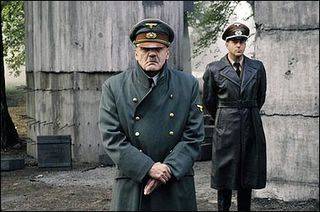Downfall
Downfall is significant in the history of German film. It's the first German-language movie to deal with Hitler as a central character, portraying him in a human fashion.
In Downfall, he's a sad, faded ideolgoue, a man with what he saw as a beautiful and unrealized dream, lashing out at those around him for his failures. In a magnificent performance, Bruno Ganz is careful to give Der Fuhrer humanity but never nobility. We see him beyond the pomp and the legend, and we see that he is not some monster, but we're never really tempted to empathize with his plight.
The rest of the film is as measured and thoughtful as its central performance. It's not exactly what I would call gripping - the pacing is slack, it is terrifically dense and talky and because the central characters are Adolf Hitler and his naive secretary Traudl Junge (Alexandra Maria Lara), there isn't really any person to actively engage throughout this 2.5 hour experience.
What you do get is a thoroughly researched and impeccably crafted recreation of the last few days of Hitler's life. Because the film is based on the memoirs of Junge, Hitler's personal assistant, we see the action through her eyes. After a brief opening, in which we see Junge's job interview in 1942, we jump to 1945, when the Bolshevik army has reached the outskirts of Berlin.
Hitler, a bevy of his advisors, his secretarial staff and soldiers descend to his massive underground bunker to hopefully outwait the invading forces and plan the reascension of The Reich.
Desperation hangs in the air. By the time the film's action begins, most everyone in the bunker knows the end is nigh. Himmler (Ulrich Noethen), Albert Speer (Heino Furch) and others urge Hitler to leave Berlin, so that he may live and plan and lead the German people for another day, but he is resigned to remain in Berlin, in his bunker, and to accept his fate.
Much is made in the film of Hitler's decision, and several theories are seemingly offered. Most compelling to me was the implicated that Hitler's insanity had slowly taken over his inner life. At times, Ganz plays Hitler as delusional. Even after the cause is lost and most of his armies have deserted their posts, Hitler still plots his victories behind a massive map of Germania. He continually speaks of how he has is undermined by the Jews, even though by this point he has imprisoned or murdered nearly every Jew in Germany. And whenever his idyllic dreamy plans for the future are questioned, he rants and raves like an injured infant.
There's something deeply strange about seeing an enfeebled, mentally weak Hitler. Part of seeing him as the ultimate representation of cruelty and malice is seeing him as a vision of unquestioned power. The imagery we have of Hitler, in Triumph of the Will, giving speeches before thousands, with all the pageantry of the Third Reich at its apex...well, it doesn't really get more powerful than that. George Bush isn't greeted that way anywhere, not even Oral Roberts University or the office of the Chevron CEO.
In Downfall, he's like a child. He loves his dog, he dotes on his wife, he has a crush on his secretary. In fact, there's something decidedly childlike about a lot of the Nazis in the film, and this, I think, is where it runs into some conceptual problems.
The largest is writer Bernd Eichinger and director Oliver Hirschbiegel's decision to take Traudl Junge at her word. Anyone who has seen Blind Spot, the documentary made about Ms. Junge before her death in 2002, will recall that she claims no knowledge of any of the atrocities committed by the Nazis in the camps against Jews, the handicapped, homosexuals, political prisoners or anyone else. She always presented herself as a totally naive bystander, someone who felt guilty because of her association with evil who was not herself evil.
I'm not sure whether or not this is true. Hey, I wasn't there. But as naive as Junge sounds by her own accounts, she's presented in Downfall ten times so. It's pretty ridiculous. There are a few scenes in the film where she listens, shocked, as Hitler rails on and on about the evils of international Jewry, and of Jewish conspiracies.
I mean, does that sound accurate? That Hitler's secretary would be shocked to hear him lambast Jewish people? Even if she didn't know he was shipping them off to Auschwitz, certainly she suspected he might be prejudiced against them. Let's be perfectly honest...a young 20-something girl who idolized and worked for Hitler, who saw herself as his employee and friend, would probably have herself greatly disliked Jews. I mean, come on, for real...
So I'm not sure Downfall really pulls off the Junge character. I suppose if you accept her as the audience substitute, the person that needs to be present to provide us with a viewpoint on the action of the film, then it's not very bothersome, but in a film that's otherwise so painstakingly realisitc and authentic, it's a rare piece of imaginitive abstraction.

2 comments:
I haven't seen this movie yet, I have to admit. But I will rent it as a DVD. Thanks for your interesting report!
I'd like Joss Whedon to have a downfall......http://www.infocusmag.com/05augustseptember/whedonuncut.htm Have you read the entire interview? It's gross. He talks about how HE would have made Return of the Jedi. Just.Gross.
Post a Comment